Danger in the Land of Enchantment
Introduction
In New Mexico, because of a dangerous loophole in the law — referred to as the background check loophole — background checks are not required when guns are sold by individuals who are not licensed dealers.
Summary
In October 2016, a violent felon from Deming tried to buy a gun. He had recently served time in prison for three felonies related to a domestic violence incident: armed with a revolver, he choked his fiancée, told her he would break her neck, and tried to force her into the trunk of her car.1Details according to affidavit for arrest warrant obtained by Everytown. His felony convictions made it illegal for him to buy or possess firearms — but now he was online and actively shopping for a Glock handgun. If he had tried to buy one at a licensed dealer, where background checks are legally required, his felony convictions would have blocked the sale. Instead, he turned to online ads—where, because of a loophole in the law in New Mexico, gun sales can be arranged with no background check required.
Policymakers have long recognized that it’s dangerous for people with a felony conviction, a history of domestic abuse, or serious mental illness to have guns.2Daniel Webster, Cassandra Kercher Crifasi, and Jon S. Vernick, Erratum to: Effects of the Repeal of Missouri’s Handgun Purchaser Licensing Law on Homicides, 3 Journal of Urban Health 91, (June 2014). People with such records, like the man described above, are legally prohibited from buying or possessing guns. That’s why licensed gun dealers—Walmart, Dick’s Sporting Goods, or any of the hundreds of local gun stores across New Mexico—are legally required to contact the background check system to run a check on every buyer. When someone who is not allowed to have a gun attempts to make a purchase, the background check blocks the sale.
But there’s a problem with this system. In New Mexico, because of a dangerous loophole in the law—referred to as the background check loophole—background checks are not required when guns are sold by individuals who are not licensed dealers.3Private or unlicensed sales are gun sales from sellers who are not licensed rearm dealers, such as individuals who only offer guns occasionally or who are making a sale from their personal collection. These sales are called “unlicensed” gun sales, and they aren’t just taking place between friends or neighbors—they’re taking place on the internet. Websites like Armslist.com, the “Craigslist for guns,” provide a platform for unlicensed gun sales to be arranged online, between strangers. Because of the background check loophole, criminals can turn to these online unlicensed sales to arm themselves illegally, no background check required, no questions asked.
To understand how often criminals in New Mexico take advantage of the background check loophole to buy guns in unlicensed online sales, Everytown investigators (1) examined the size of the state’s unlicensed online sale market, and (2) posted for-sale ads online, tracking how many responses were from New Mexicans prohibited by law from
buying or possessing firearms.
The findings are unambiguous: New Mexico criminals—including people convicted of crimes like attempted kidnapping, armed robbery, and assault with a deadly weapon—are turning to unlicensed online gun sales to arm themselves. That’s exactly what the convicted felon from Deming did. In October 2016, he responded to an online ad (posted by an Everytown investigator) for a Glock 19 handgun.
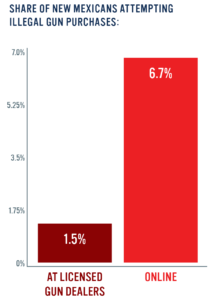
- On just two popular websites, New Mexico unlicensed sellers post more than 4,000 unique gun ads annually, none of which legally require a background check.
- One in fifteen (6.7%) individuals who were attempting to purchase guns from Everytown investigators was found to have criminal records that made it illegal for them to purchase a gun. Of particular concern, 64 percent (9 of 14) of those prohibited buyers were facing open criminal charges, were on probation or parole, or had warrants out for their arrest when they contacted investigators.
- The rate of attempted illegal purchases is four times higher online than it is at New Mexico’s licensed dealers, indicating that people legally prohibited from gun possession may be turning to unlicensed online sales rather than attempting a purchase at a licensed dealer where a background check is required.

Online gun sales aren’t always a threat to public safety, but when they happen without background checks, that’s exactly what they can become. In states that require background checks for all handgun sales— not just sales at licensed dealers—the toll of gun violence is lower, including fewer women shot to death by their intimate partners, and fewer law enforcement officers shot and killed in the line of duty.
Nineteen states and the District of Columbia have acted in the interests of public safety and closed the background check loophole. New Mexico hasn’t joined them yet—and until that changes, thousands of guns will remain accessible to any criminal with an internet connection, no background check required, no questions asked.
The Loophole
Background checks, public safety and the background check loophole
Lawmakers and public safety experts have long recognized that it’s dangerous for people with a felony conviction, a history of domestic abuse, or serious mental illness to possess guns; those factors indicate an increased risk of harm to oneself or others.4Daniel Webster, Cassandra Kercher Crifasi, and Jon S. Vernick, Erratum to: Effects of the Repeal of Missouri’s Handgun Purchaser Licensing Law on Homicides, 3 Journal of Urban Health 91, (June 2014). That’s why federal law prohibits people with those records from buying or possessing guns.
In order to enforce the federal firearm law, Congress created the National Instant Criminal Background Check System (NICS). Since 1998, licensed firearm dealers have been required to contact NICS for a background check on every buyer. When a person prohibited by law from buying firearms attempts to make a purchase, that background check stops the sale.
Since the background check system was implemented, it has blocked nearly three million gun sales across the country to people legally prohibited from having firearms, including over 26,000 sales in New Mexico alone.5Everytown for Gun Safety analysis of FBI data, December 2016.
Not all gun sales require background checks.
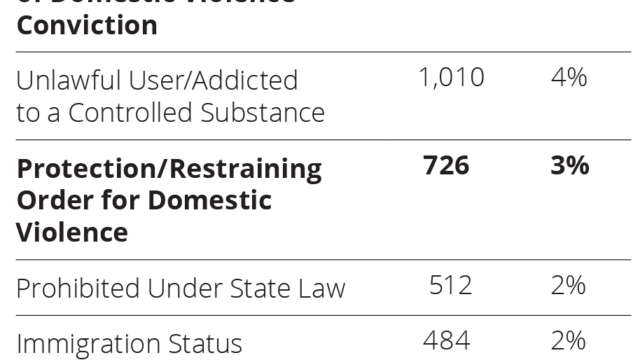
Neither federal law nor New Mexico state law requires background checks for guns transferred in unlicensed sales—meaning any sale that is not made by a licensed gun dealer, including sales between strangers who meet online. This means that people legally prohibited from gun possession can purchase a gun through an unlicensed sale with no background check required, no questions asked. And Everytown research shows that people who could not pass a background check at a gun store attempt to buy guns through unlicensed sales on the internet instead.1See: Everytown for Gun Safety, The Wild Wild Web: Investigating Online Gun Markets in Nevada, January 2016, available at http://every.tw/1TJel1K.
Neither federal law nor New Mexico state law requires background checks for guns transferred in unlicensed sales—meaning any sale that is not made by a licensed gun dealer, including sales between strangers who meet online. This means that people legally prohibited from gun possession can purchase a gun through an unlicensed sale with no background check required, no questions asked. And Everytown research shows that people who could not pass a background check at a gun store attempt to buy guns through unlicensed sales on the internet instead.6Everytown for Gun Safety, “Background Checks Reduce Gun Violence and Save Lives”, January 2017, available at: http:// every.tw/2jvUtTc.
There is strong evidence that closing the background check loophole saves lives. In states that require background checks for all handgun sales, 47 percent fewer women are shot to death by their intimate partners, 53 percent fewer law enforcement officers are killed with guns, and there is 48 percent less gun trafficking in cities.7Everytown for Gun Safety, “Background Checks Reduce Gun Violence and Save Lives”, January 2017, available at: http:// every.tw/2jvUtTc.
The Investigation
Unlicensed Internet GunSales in New Mexico: Methods and Findings
To understand the public safety impact of New Mexico’s background check loophole, particularly as it applies to online unlicensed sales, Everytown investigated (1) the number of guns for sale online without a legally required background check; and (2) how frequently criminals, domestic abusers, and other would-be purchasers who are legally prohibited from having guns seek out firearms through unlicensed online sales.
Methods
To estimate the number of guns available online through unlicensed sellers in New Mexico, Everytown researchers reviewed ads on two websites, Armslist.com and Backpage.com, both of which are commonly used by New Mexicans to post classified ads offering firearms. Everytown used a software program to record all gun ads posted by New Mexico sellers on both websites over a one-year period, then excluded ads from licensed dealers, ads that did not offer firearms for sale (e.g. ads for ammunition), ads for sales outside of New Mexico, and duplicate ads. Everytown conducted a quality review of the data and adjusted the estimate to account for potential errors.
To assess how frequently criminals, domestic abusers, and other would-be purchasers who are legally prohibited from having guns seek out firearms through unlicensed online sales, Everytown investigators placed 27 for-sale firearm ads—26 on Armlist.com and one on Backpage.com, over a 36-day period. When respondents to the ad voluntarily provided identifying information, investigators searched publicly available court records to identify whether any of these would-be buyers had felony convictions, domestic violence misdemeanor convictions, bench warrants, orders of protection, or other records that would prohibit them from purchasing a gun.8In the course of this investigation, investigators initiated contact with law enforcement in certain instances that involved a potential imminent threat or other ongoing or recent contact with the criminal justice system. The federal prohibition on firearm possession does not apply if a person has been pardoned for their criminal conviction or had their civil rights and rearm rights restored under state law. 18 U.S.C. §921(a)(20)(B),(33)(B)(ii).
For a more detailed description of Everytown’s research methods, see Appendix 2.
Findings
There are over 4,000 guns for sale by unlicensed internet sellers in New Mexico, none of which legally require a background check.
Researchers identified an estimated 4,057 unique online ads for unlicensed firearm sales in New Mexico posted on Armslist.com and Backpage.com over the course of a year. As a result, on any given day, when a would-be buyer logs on to look for a gun, they are likely choosing from hundreds of options of firearm sales from unlicensed sellers. None of those firearm sales would legally require a background check.
One in fifteen New Mexicans attempting to purchase a gun from Everytown investigators had criminal records that made the purchase they were attempting illegal.
The firearm ads posted by Everytown investigators received responses from 209 New Mexican would-be buyers who voluntarily provided identifying information. Fourteen would-be buyers (6.7%) were found to have criminal records—including for child abuse, domestic violence, heroin distribution, and attempted kidnapping—that made it illegal for them to purchase guns.
Of particular concern, 64 percent (9 of 14) of those prohibited buyers were facing open criminal charges, were on probation or parole, or had warrants out for their arrest when they contacted investigators.
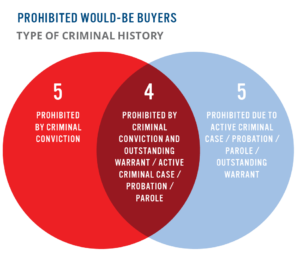
In New Mexico, the rate of attempted illegal purchases in the unlicensed online market is four times higher than it is at licensed firearms dealers.
At New Mexico’s licensed dealers, background checks block 1.5 percent of purchases because the buyer was barred by law from buying and possessing firearms—in line with national rates.9Bureau of Justice Statistics, “Background Checks for Firearm Transfers, 2013–14 Statistical Tables”, June 2016, available at: https://www.bjs.gov/content/pub/Miller M, Hepburn L, Azrael D. Firearm Acquisition Without Background Checks: Results of a National Survey. Ann Intern Med. [Epub ahead of print 3 January 2017]. In contrast, 6.7 percent of those who responded to Everytown’s online gun ads were prohibited by law from buying and possessing firearms — a rate over four times higher than the share of prohibited purchasers attempting to buy firearms at licensed dealers.10From 1998 to 2014, the last year for which data is available, New Mexico gun dealers conducted 1,655,972 background checks on would-be gun buyers, and 24,897 (1.5 percent) of those would-be buyers failed the check due to fugitive status, felony conviction, MCDV conviction, unlawful user status, active protection order, or indictment – the categories would-be buyers in this investigation were tested against. The difference suggests that people who are not legally allowed to buy guns are aware of the background check loophole, and turn to unlicensed internet sellers at a higher rate than they do licensed dealers.
Prohibited would-be buyers seeking guns online in New Mexico
In the course of this research, Everytown investigators observed the following individuals attempting to buy guns in unlicensed sales without background checks—despite the fact that their criminal records barred them from buying or possessing guns.
Prohibited Buyers: Case Study
A Felony Domestic Abuser Attempting to Buy a Glock Handgun
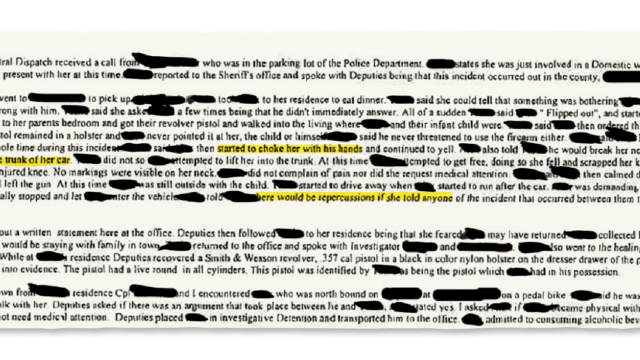
In late 2012, a 22-year-old man from Deming was at home eating dinner with his fiancée and their infant child when, according to court documents, he “flipped out”, ordering his fiancée and their infant outside. Armed with a revolver, he choked his fiancée, told her that he would break her neck, and ordered her to get into the trunk of her car, attempting to physically force her inside the vehicle. He told her there would be repercussions if she told anyone of the incident.
The defendant was arrested and charged with felony attempted kidnapping, felony aggravated battery against a household member with a deadly weapon, and felony aggravated assault against a household member with a deadly weapon. In May 2013, he pled guilty to all three counts. Each of these felony convictions prohibited him from buying or possessing guns under federal and New Mexico state law.
But on October 13, 2016, this convicted domestic abuser was attempting to buy a gun online. He responded to an ad posted by Everytown investigators on Armslist for a $300 Glock 19 handgun.
Prohibited Buyers: Case Study
A Man Out On Bond For Multiple Felonies Attempting To Buy An AK Rifle

According to court documents obtained by Everytown, in September 2015, a 29-year-old man from Albuquerque got into an argument with a stranger at a bar and then followed the stranger, the stranger’s girlfriend, and the couple’s two-month-old son to the family’s car in the bar’s parking lot. As the family began to drive off, the man fired multiple shots with a .45-caliber handgun, hitting the car. No physical injuries were reported.
One year after the shooting, in September 2016, the alleged shooter was arraigned on several felonies stemming from the incident, and pled not guilty. He was released on bond with a GPS bracelet and ordered to abide by a 6:00 p.m. curfew. As a condition of his bond, he was also prohibited from buying or possessing weapons, including firearms.
Just two weeks after being released on bond, the defendant was seeking firearms. He repeatedly called and texted Everytown investigators about an ad they had placed on Armslist.com offering an AK WASR 10 rifle. He offered $300 cash, and noted that “we don’t need a bill of sale or none of that.” He told investigators that he was only available to meet before 6:00 PM, saying that he “takes care of (his) mom at night.”
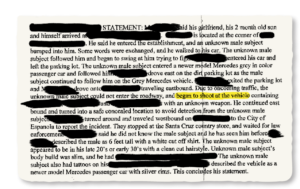
Prohibited Buyers: Case Study
A Repeat Felon Attempting to Purchase a Mac-11 Semi-Automatic Pistol

In November 2014, Bernalillo County police received a report of two men entering a private home through a window. When they arrived, the officers found the home “ransacked”, and apprehended a 25-year-old man and his cousin. Officers found a stolen diamond and gold necklace on the 25-year-old, and placed him under arrest.
The man pled guilty to felony residential burglary. This was not his first run-in with the law; his sentence contained an additional year in prison due to his habitual offender status. He had previously pled guilty to multiple felonies, including felony aggravated assault with a deadly weapon against a household member in 2013, and felony auto burglary in 2009. These felony convictions prohibited the man from buying or possessing guns under federal and state law.
Five months after his sentencing, in July 2016, he was moved to a halfway house, which he illegally fled two weeks later. He briefly checked in with his probation officer by phone, where he admitted to using methamphetamines and tranquilizers.
After that phone call, a bench warrant was issued for the man’s arrest. But that didn’t stop him from responding to an ad Everytown investigators had posted on Armslist.com. The ad offered a Mac-11 semi-automatic pistol for sale. Using a fake name, this felon emailed, texted, and called to offer cash for the gun and to ask if a bill of sale would be required to complete the transaction, or if it would “just be a private sale.”
Conclusion
This investigation provides the first quantitative analysis of the vast online market in New Mexico, where thousands of guns are available to anyone with an internet connection, no background check required and no questions asked. And it provides clear evidence that criminals are taking advantage of a loophole in New Mexico law to avoid background checks and obtain firearms from law-abiding gun owners—and without a background check on the sale, those law-abiding gun owners have no way to know they’re arming a criminal.
Lawmakers in New Mexico can close the background check loophole by extending background check requirements to all gun sales, a measure that 87% of New Mexicans support.11Research & Polling, Inc., Poll for Everytown for Gun Safety, January 2017, available at: http://every.tw/2jSy5l2. Other states have recently improved their laws in similar ways. As of January 2017, nineteen states, home to approximately half of the United States population, require background checks for all handgun sales.12CA, DE, IL, MA, NJ, OR, WA, CO, IA, MI, NY, PA, CT, HI, MD, NE, NC, RI, NV. For more information, see: http://bit.ly/1niplpa. Everytown analysis of US Census data, December 2016.
These states are already seeing results. For example, in Colorado, where the state legislature passed a law requiring background checks for all gun sales in 2013, dealers have conducted nearly 53,000 background checks for sales by unlicensed sellers. These background checks blocked over 1,000 gun sales to criminals and other people prohibited from buying guns.13Colorado Bureau of Investigation, Firearms Instacheck Unit, available at: http://1.usa.gov/1OxmAa4. Centers for Disease Control, “WISQARS” (Web-based Injury Statistics Query and Reporting System),” available at http://1. usa.gov/VTdKK9 (last accessed December 2016). And contrary to predictions by the law’s opponents that this would deter legal gun ownership, the gun market in Colorado — including sales by unlicensed individuals online—continues to flourish.
Online gun sales don’t have to be a threat to public safety. Closing the background check loophole makes states safer from gun violence, a significant threat to New Mexicans: in the last ten years, there have been 3,157 gun deaths in New Mexico.14Centers for Disease Control, “WISQARS” (Web-based Injury Statistics Query and Reporting System),” available at http://1. usa.gov/VTdKK9 (last accessed December 2016). Until policymakers make sure all gun sales require a background check, thousands of guns will remain accessible to criminals in New Mexico, no questions asked.
Appendices
Learn More:
Everytown Research & Policy is a program of Everytown for Gun Safety Support Fund, an independent, non-partisan organization dedicated to understanding and reducing gun violence. Everytown Research & Policy works to do so by conducting methodologically rigorous research, supporting evidence-based policies, and communicating this knowledge to the American public.

